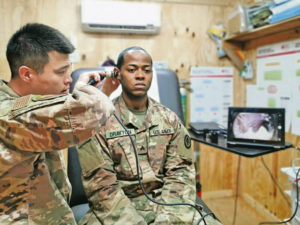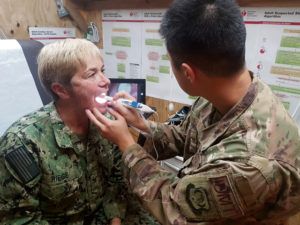Information technology experts from Landstuhl Regional Medical Center recently joined forces with the U.S. Navy Health System to establish a virtual health connection between the USS Mount Whitney, an amphibious command ship, and the U.S. Naval Hospital in Naples, Italy.
According to Navy medical officials, establishing video teleconference capability on a warship underway isn’t a simple task. The connection must be secure, using equipment organic to the ship, and have high bandwidth to connect with medical specialists ashore.
“Formal, video-enhanced virtual health connectivity to Navy ships while underway has been a challenge and is not yet routinely available, particularly not on an unclassified platform,” said Lt. Cmdr. (Dr.) Isaac Schwartz, staff otolaryngologist with the U.S. Navy Hospital Naples. “The goal was to ensure a connection between the Mount Whitney and the hospital using the Landstuhl Regional Medical Center system, which would drastically augment access to specialty care for sailors aboard ship.”
According to Navy medical officials, virtual health capabilities provide the Navy with much-needed flexibility and assists in ensuring sailor readiness.

“Our active duty service members should not have to sacrifice on the level of care they receive when they are deployed,” said Navy Capt. Valerie Riege, Chief Innovation and Integration Officer for the Navy’s Bureau of Medicine and Surgery. “Virtual health is a gamechanger in medicine today and will bring quality health care to the warfighter when and where they need it.”
Providing ship-to-shore virtual health connectivity reduces the chance for mishaps and possible injury to patients and crew during medical evacuations from an ocean-going vessel.
“Virtual health connectivity from ship-to-shore allows Navy ships to remain on mission and not always having to divert due to the illness, or suspected illness, of a Sailor unless absolutely necessary,” said Col. Andrew Baxter, regional nurse executive for Regional Health Command Europe. “Being able to observe a patient virtually allows providers onshore to better diagnose the situation and provide recommended treatment from afar. In non-life-threatening, or emergent cases, medical treatment can usually be postponed until the ship arrives back in port.”

While this particular connection was ultimately successful, providing a virtual health connection from ship to shore requires a great deal of coordination and presents unique challenges.
“The virtual test was highly successful and audiovisual connections at all locations were very clear,” said Judson Rackley, a telecommunications systems manager at Landstuhl Regional Medical Center. “We worked together with Navy and Defense Information Systems Agency personnel to test different methods of connection in order to identify what would provide them with the most reliable connection. The biggest challenge was the interoperability between networks, resources available on the Navy ship due to security concerns, and coordination between multiple locations around the globe.”
According to military medical officials, a formal memorandum of agreement was signed between Landstuhl Regional Medical Center and the U.S. Navy Hospital Naples in 2019. This memorandum delineates the relationship and responsibilities for virtual health services provided through LRMC’s Virtual Medical Center-Europe.

“The formal agreement outlines how Navy medical facilities do business with Regional Health Command Europe,” said Ron Keen, chief of virtual health for Regional Health Command Europe. “It allows us to have established rules of engagement that both Navy facilities and our facilities follow to ensure patient access to care, patient privacy, appointing guidelines, and patient management. It also allows the parties involved to obtain privileging by proxy which means one physician can practice medicine virtually in another health facility in the Navy Health System. We also have a similar agreement with the Air Force.”
“As this is now a Defense Health Agency funded program of record, and will eventually be staffed by DHA personnel, we expect the relationship will continue for years to come,” added Keen.


